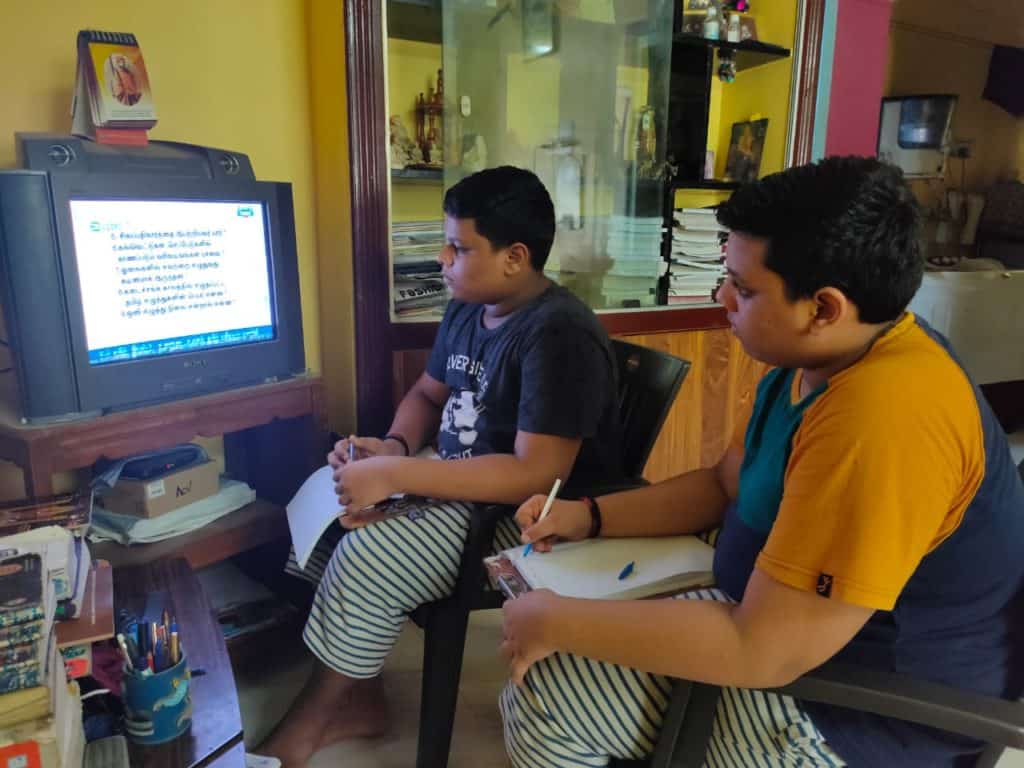Three months and a number of loans — This is what it took for S Mohammed Thameem’s father to buy a smart mobile. Thameem is a student with hearing disability, studying in Class 10 at the St Louis Institute of Deaf and Dumb. He had already missed classes for more than three months, due to the lack of a smartphone. Whenever his friends sent a screenshot of their virtual attendance, Thameem would be sad and gloomy.
With a salary of Rs 6,500 per month (after the pay cuts, due to the COVID-19 driven economic crisis), it was not easy for Thameem’s father to arrange for Rs 7000 to buy a mobile. But after considerable struggle, he finally managed to get one. Every morning at 9 am, Thameem diligently attends online classes and tries to make notes. But even after all these efforts, is Thameem’s education going as the family would have desired? The answer is no.
Many hurdles to overcome
While Thameem’s hearing disability had never been a major hindrance to learning in the classroom setting that he was used to, it is an entirely different matter now that classrooms have become virtual. He is a studious pupil, with a deep liking for Science and Maths. But under the current circumstances, he finds it difficult to grasp the subjects; most of his friends with similar disability also feel the same way.
Online learning is still in its teething phase, with teachers and students rising to the crisis without proper training. Individualised teaching, group activities and visual elements that are central in teaching students with hearing disability are missing in the current online set-up.
If, for example, a module on e-commerce has to be taught, the teacher has to correlate it with examples, break down the jargon and initiate a few hands-on activities on the subject. Even though online teaching applications have such provisions, teachers are not well versed.
“A lot of teachers do not have blackboards in their houses. Evern simple things, such as screen sharing, are new to us and not something many of us know,” admits S Nagarani, who has been teaching students with hearing disability for more than ten years.
Several elements and methodologies critical to teaching students with hearing impairment, such as group discussions, are difficult to replicate in online teaching. The attention span of students with hearing disability is very less, another factor that makes online classes less effective for them.
While a long break from studies reduces the productivity of any student, it has a special effect on the differently-abled. “Students with hearing disability have difficulties with orientation and communication. Since their grasping skills are not highly developed, they need to be engaged in a continuous cycle of learning. Any break from studies will have an adverse effect on their cognitive skills,” says Sam Louis, who has been teaching the students with hearing disabilities for four years.
Take the case of S Naveen, a student with a hearing disability, who has not been able to attend online classes due to the lack of a smartphone. This has created a break in his studies and the hardworking student is slowly losing interest. “I have no knowledge about the subjects they learn, so it is not possible for me to teach him,” says his mother Bhuvaneswari S.
A beacon of hope
Meanwhile, the school education department of the Tamil Nadu Government has taken up an initiative, as part of which they are telecasting classes through Kalvi TV, an exclusive educational channel. For over three months now, this channel has been holding classes for all students of Tamil Nadu, and interprets content for children with hearing impairment.

This has proved to be highly beneficial for students such as Thameem, who starts watching these classes every morning at 8 am, and meticulously notes down the concepts taught on screen. He has even grasped crucial topics in physics, such as dilation and buoyancy, through these classes.
“The explanations and interpretations are a bit fast for me to understand, I find. But I am happy that I can learn something at least,” he says in sign language interpreted by his father.
However, this initiative benefits only a small number of children — only those who are pursuing Class 10. “We are yet to start interpretations of content for students of Classes 8 and 9. We are currently working on the project,” said P A Naresh, special officer for Kalvi TV and Joint Director (Vocational Education), School Education Department when we spoke to him in August.
Since then, some classes have been telecast for Class 9 students according to Nagarani.
- Kalvi TV is Channel no 821 in Airtel DTH. It is telecast in 11 different channels including Makkal TV and Raj TV.
- Classes are telecast from 6 am to 11 am. Repeat programmes can be watched between 11 am and 6 pm.
- One can also subscribe to Kalvi TV official on Youtube; lessons are uploaded a day after it is telecast on the television.
- Questions and feedback are to be sent to kalvitvofficial@gmail.com. Saturdays are for interaction with Class 10 and 12 students.
Despite their best efforts however, some students complain about not being able to grasp the interpretations. P A Naresh admits that students and teachers are so accustomed to the chalk-talk method of learning that the shift to any kind of digital mode is tough. “I understand the difficulty; we will try to make it easier for them in the next recording.”